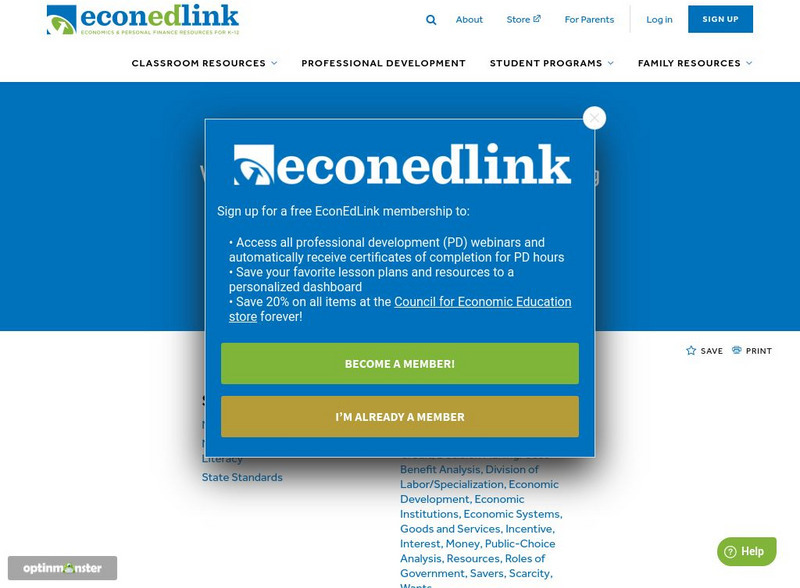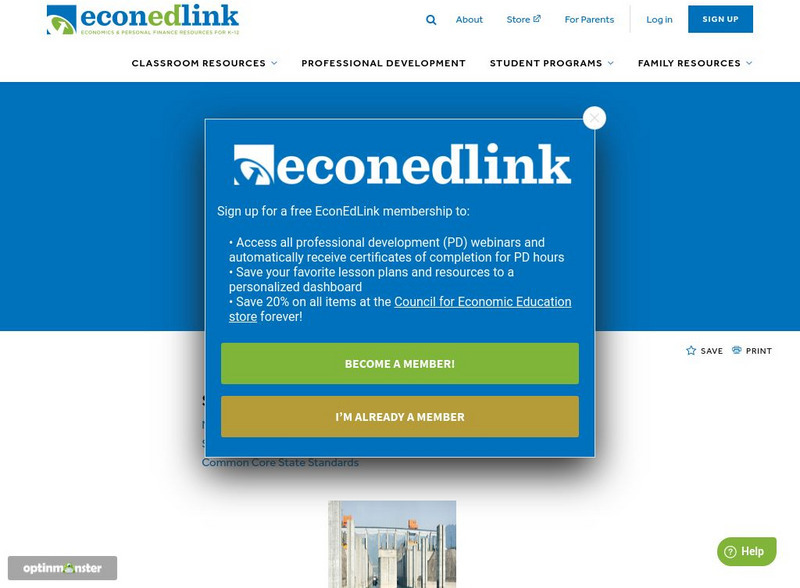Council for Economic Education
Econ Ed Link: Believe It or Not?
This lesson reveals to students how advertisers use words and images to make goods and services look their best. To protect consumers and make sure that competition among sellers is fair in the marketplace, the federal government...
Council for Economic Education
Econ Ed Link: Why Work Now?
Why do people work so hard? Why aren't you just assigned a job that you are interested in and get paid as much as the next guy? This instructional activity will show you why employers want the best workers that their money can buy!
Council for Economic Education
Econ Ed Link: From Butterflies to Buffaloes
Nature tourism, also known as ecotourism, is a fast growing segment of the tourism industry. In this lesson, students learn what ecotourism is and explore how conservation of our natural resources can be profitable.
Council for Economic Education
Econ Ed Link: Us History: Inventors & Entrepreneurs
Students will learn the difference between inventors and entrepreneurs. From talking with adults they will learn some of the benefits inventors and entrepreneurs have provided for society in the last 40 years.
Council for Economic Education
Econ Ed Link: Bill, Are You Bogus?
In a barter system, people have to trade goods and services for other goods and services. In an economy that produces millions of goods and services, barter is very difficult. Think of all the stuff (goods and services) you have.
Council for Economic Education
Econ Ed Link: The Effects of the Recession
The students learn how a recession affects our economy, and how it might affect them personally.They examine the role the federal government has played in dealing with the current recession. They analyze their thoughts about what role...
Council for Economic Education
Econ Ed Link: You're Going to College
The middle schoolers will explore the costs and the benefits of going to college. They participate in a three-part game designed to help them understand the decisions associated with attending college and the benefits available to...
Council for Economic Education
Econ Ed Link: The Prices Are Changing
This lesson will help students to understand how markets are created by the interaction of buyers and sellers, what demand and supply are, what equilibrium price is, and how demand and supply interact with price changes.
Council for Economic Education
Econ Ed Link: Dumptown, Usa: Making a Ton of Difference
The amount of trash produced in the United States is mounting with each passing year. Communities are finding it increasingly difficult and costly to handle trash disposal. Recycling is considered a key solution to the garbage problem....
Council for Economic Education
Econ Ed Link: What Is Money? Why Does It Have Value?
In this lesson, middle schoolers consider the fact that the value of money differs depending on where the money is being spent. In order to understand this idea, students will first develop a deeper understanding of what it means for...
Council for Economic Education
Econ Ed Link: Lemonade for Sale!
Middle schoolers will become online entrepreneurs, taking risks and changing their production method to increase their profit while running a lemonade stand. This lesson might best be taught after students have learned about the basic...
Council for Economic Education
Econ Ed Link: The Civil War: A War of Resources
The North won the Civil War in large part due to its superior resources. In this lesson students will learn the difference between capital resources, human capital, and natural resources. They will investigate and compare the resources...
Council for Economic Education
Econ Ed Link: Work, Earnings and Economics: Using Lyddie by Katherine Paterson
In reading and discussing Lyddie, by Katherine Paterson, young scholars examine basic economic concepts and explore the growth of labor unions and the role of government in a market economy.
Council for Economic Education
Econ Ed Link: The Choice Is Us: Monopolies
This lesson introduces the concept of monopoly. It calls upon young scholars to consider how monopoly power might affect the quality and price of goods and services offered to consumers. In light of what they learn about the history of...
Council for Economic Education
Econ Ed Link: The Higher You Climb, the More You Pay
Students will take a "Virtual Tour" of the Eiffel Tower in Paris France and locate the price of a bottle of water at each viewing platform. They will need to problem solve how to pay for admission, buy the water and be able to pay for...
Council for Economic Education
Econ Ed Link: The Price of Gasoline: What's Behind It?
In this instructional activity, students investigate the variables that contribute to the cost of gasoline. They learn that while OPEC nations do influence the price of oil and thus the price of gasoline, other factors also influence the...
Council for Economic Education
Econ Ed Link: No Fireworks on the 4th of July
This lesson explores the differences between public and private goods.
Council for Economic Education
Econ Ed Link: Fad or Fortune
This lesson focuses on collectibles and how they retain, lose, or gain value. In each round of a trading simulation, students will learn more about the value of their collectibles and discuss why items gain or lose value. They will...
Council for Economic Education
Econ Ed Link: Sand Art Brownies
In this lesson, you will learn about substitute goods. You will have choices to make in your role as a shopper. In making these choices, you will decide whether you are willing to accept one good as a substitute for another or not. Are...
Council for Economic Education
Econ Ed Link: Agent Pincher: The Case of the Missing Susan B. Anthony Dollar
Agent Penn E. Pincher is again called out on a case. It seems that in 1979 the U.S. Bureau of Engraving launched a new one-dollar coin. However, most citizens haven't seen it in several years. This case may be from the cold case files....
Council for Economic Education
Econ Ed Link: Agent Pincher: P Is for Penny or Where Did Money Come From?
What if we woke up tomorrow and found that there were no more pennies? Or what if we found that money had disappeared altogether -- not only from our pockets but from banks, stores and all the other places where we would expect to find...
Council for Economic Education
Econ Ed Link: Cost/benefit Analysis: Three Gorges Dam
This instructional activity will allow students to evaluate the costs/benefits of the Three Gorges Dam project on the Yangtze River in China. The purpose of this instructional activity is to encourage students to look at a complex issue...
Council for Economic Education
Econ Ed Link: Where's the Beef?
Students explore meat consumption statistics, an indicator of a nation's relative prosperity and standard of living. They do a survey of a family's meat consumption and compare their results to statistics from Colonial and modern- day...
Council for Economic Education
Econ Ed Link: Lewis and Clark Barter With the Native Americans
Using the study of the Lewis and Clark expedition students will define the term barter and give examples of bartering.





